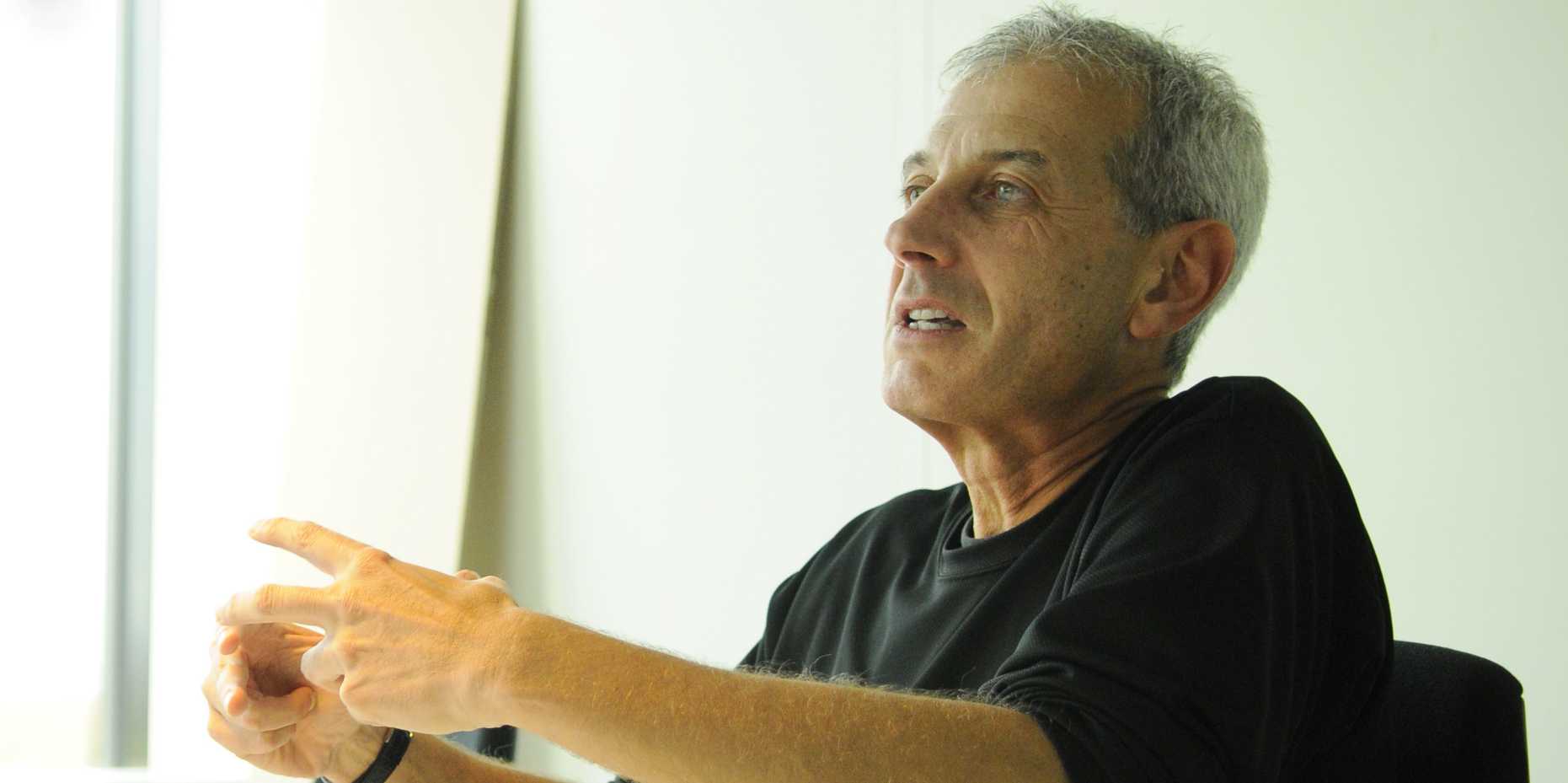The urban writer
Marc Angélil played a decisive role in shaping the teaching of architecture at ETH Zurich, both as professor and as temporary head of the department. For years he has been researching the political, social and economic drivers of global urbanisation. Now in retirement, he takes a new, critical look at the latest urbanisation trends in a wide-ranging book and exhibition.

At first glance, Marc Angélil is not a man who stands out. With his slim build, mostly black attire and discreet Junghans watch, he cuts a rather purist figure. Sometimes you might see a blot of ink on his forearm – traces of his black fountain pen, which goes with him everywhere and which he likes to use to explain his thoughts to whoever he’s speaking to in simple sketches during meetings. What does stand out is the restless, radiant and engaging look that comes over Angélil when he begins to talk about his work as an ETH professor, widely travelled researcher and distinguished architect. His curiosity about the world seems unbroken even at the age of 65. As a ten-year-old, he would already spend entire days reading in his grandfather’s library in Alexandria, where he grew up. To this day, he reserves one hour of his generally long working day for reading. Even more of his time is devoted to writing: since graduating from ETH Zurich 40 years ago, he has written hundreds of essays and several books on topics related to architecture, urbanisation and urban planning. Driven by the urge to fathom and understand the dynamics of urbanisation on the ground, he has worked his way through Cairo, Rio de Janeiro, Addis Ababa, Shanghai, Mumbai, Paris and Zurich.
«The American»
We meet for the interview near Zurich’s Letzigrund stadium in the bright, open-plan office of agps, the architecture practice Angélil set up in 1982 with Manuel Scholl and his partner, Californian architect Sarah Graham. She was also the one who encouraged him to move to the United States back then, having battled her way through several Swiss winters. After a teaching assignment at Harvard University near Boston, Angélil moved to Los Angeles, where he spent seven years as an assistant professor at the University of Southern California. “It was my experiences in Los Angeles that brought me to urbanisation as a research topic,” he explains. His fascination for the metropolis, its heterogeneity and contradictions, coupled with the postmodern discourse of the 1980s at the university, changed his relationship with architecture forever. He returned to his alma mater as an assistant professor in 1994. “You don’t find comparable conditions as a professor anywhere else,” he explains. But things were tough for him in Zurich at the beginning. His colleagues in the department just called him “the American”. This had nothing to do with Angélil’s accent. It was his perspective on architecture. He began to get interested in agglomerations, outskirts, urban infrastructures, socio-spatial relations and global urbanisation processes. Topics that were, at that time, not yet considered the core competencies of architecture in the strict sense.
This broader view of city and architecture, coupled with the social, political and economic drivers of global urbanisation, were to shape Angélil’s research and teaching from then on; the “political economy” of construction became his guiding concept on the theoretical front. “What are the forces that are actually driving construction today?” he asks rhetorically. “It’s capital! The economy has become the be-all and end-all of architecture.” Yet this is something that has so far been underrepresented in architecture studies. Economic developments, such as the global financial crisis from 2007 onward, are radically changing life in urban centres today – with a speed and brutality that often leaves traditional urban planning in the dust. This also raises new questions about the relationship between formal and informal construction, especially in the global south, a recurrent theme in Angélil’s work.
Undying plans
In developing an MAS in Urban Design, Angélil took the new challenges facing architects and urban planners and translated them into a teaching context. The result is a transdisciplinary degree programme with a global dimension. At its heart is a studio where students conduct their own field research in a specific urban context. The construction of social housing is one example. Here, a group looked for possible ways of including informal construction activities in official government programmes. Based on an in-depth analysis, the group supported co-operation between social housing activists, housing co-operatives and the authorities. Eventually, the department was commissioned by the responsible authority to build 500 housing units using the construction kit that had been specially developed for inclusive and sustainable social construction. But in the end the project failed because of a harsh reality in Brazil: the land allocated for the plans became embroiled in a corruption scandal. Despite his disappointment, Angélil remains convinced: “Our plans and recommendations have been published, they live on.”
Several studios have been working on projects concerning Angélil's country of origin, Egypt, because he is both fascinated and shocked by the upheavals there. “Today, popular districts in Cairo, where more than ten million people live, no longer appear on any official map. These people do not exist as far as the state is concerned.” Elsewhere along the Nile, the city is eating its way into arable land and thus endangering the food supply for the population. At the same time, El-Sisi’s government is building brand new cities with luxury hotels and shopping malls in the desert with the help of international investors and Chinese developers. Angélil’s book “Housing Cairo”, published in 2016, bears witness to the fact that architecture and urban planning are always political. On his way to Cairo with a few copies in his luggage, Angélil was stopped by the authorities and the book confiscated on the grounds that it contained plans of informal settlements that did not officially exist. The book is now out of print. “It became a best-seller overnight because of the ban,” Angélil recalls, laughing mischievously.
His latest, almost 1,000-page book, “Mirroring Effects. Tales of Territory”1, is a collection of ten great stories about recent urban developments – including accounts from Egypt and Brazil. He spent ten years working on this opus magnum with his research assistant Cary Siress. “Many of the tales read like horror stories about how man transforms his territory and recreates the earth,” says Angélil, “only they’re not fairy tales.”

Experiencing space with the tango
His past students and assistants will remember Marc Angélil not only for his keen analysis, well-founded criticism and philosophical digressions, but also for his experimental and playful teaching methods. For 13 years Angélil was in charge of the design class in the first year of the degree programme, with around 300 students going through his course every year. His “tango exercise” was an integral part of it. In the morning, the professor gave a lecture on the relationship between shape and ground. In the afternoon, tango dancers were invited into the technical drawing classroom. The students then had to put the space between the dancers and their surroundings down on paper, first through observation and then by dancing it. Finally, they had to model the spatial experience in plaster of Paris. “Right from the beginning of their studies, we wanted to inspire the new students with the sensual and tactile nature of architecture.” Today, the “tango exercise” is also used in architecture degree courses in South Korea, Ethiopia, Mexico and China.
Angélil is also proud of the first edition of “ETH Singapore month”, a new teaching format that he developed together with Rector Sarah Springman and colleague Aurel von Richthofen. It is part of the Future Cities Laboratory in Singapore, of which he is one of the founding fathers. 21 ETH students from 17 different disciplines, together with students from seven other universities, spent a month seeking solutions to the challenges facing urban societies – on a transdisciplinary basis and applying design thinking methods. “What we wanted the students to do was develop their own attitudes, reflect critically on current developments and also become politically active," says Angélil, summarising the goals. “In times of rising populism, there is nothing more important.”
More time in the US
Asked how he is going to spend his time after retirement, Angélil says he is looking forward to having new freedom to indulge his old passion. He is largely stepping back from his architectural practice agps, which today employs a staff of 20. “It’s time to make room for a new generation.” He plans to spend more time back in California with his partner. Their recently renovated ranch in the countryside offers an inviting place to relax, but he says he usually gets bored after a few days. He’s already had a tempting offer of a dean position at an American university. And then there’s the large-scale research project on China’s construction activities in Africa, for which he has applied for funding from the Future Cities Laboratory. So it’s safe to say that his countless publications over the past 40 years will soon be joined by a few more.
«Mirroring Effects: Tales of Territory»
1 «Mirroring Effets: Tales of Territory» by Marc Angélil and Cary Siress was published by Ruby Press (Berlin) in May. external pagehttp://ruby-press.com/shop/mirroring-effects-tales-of-territory/call_made
Marc Angélil's farewell lecture
Marc Angélil's farewell lecture with the title «Tales of Territory: Athropocene, Urbicene, Capitalocene» will take place on the 3rd of October 2019 at 17.15 in the Auditorium Maximum at ETH Zurich. At 18.15 the opening of his exhibition «Terrestrial Tales: 100+ Takes on Earth» will take place in ETH's main building. https://angelil.arch.ethz.ch/portfolio-item/farewell-lecture-eth-2019/
